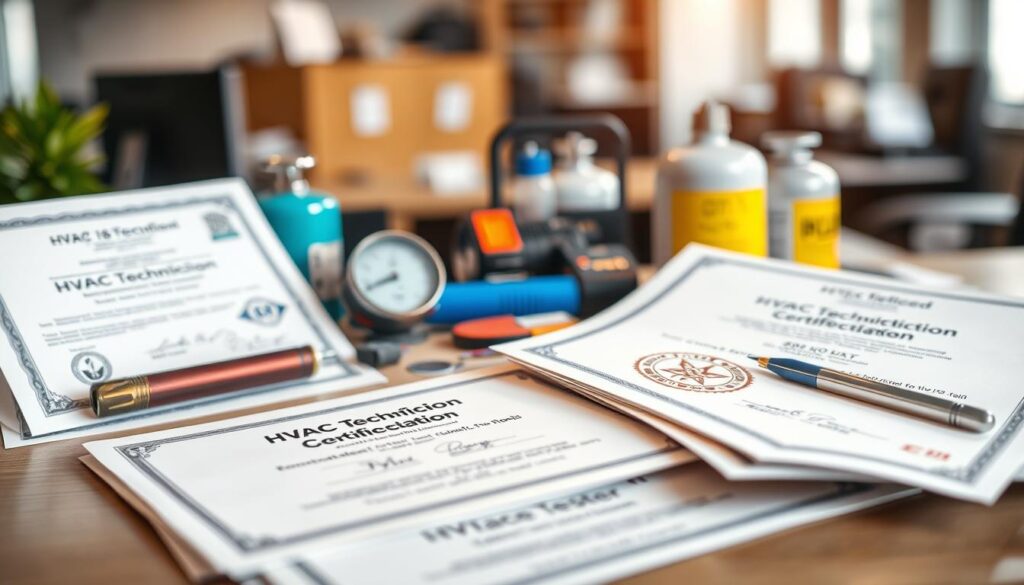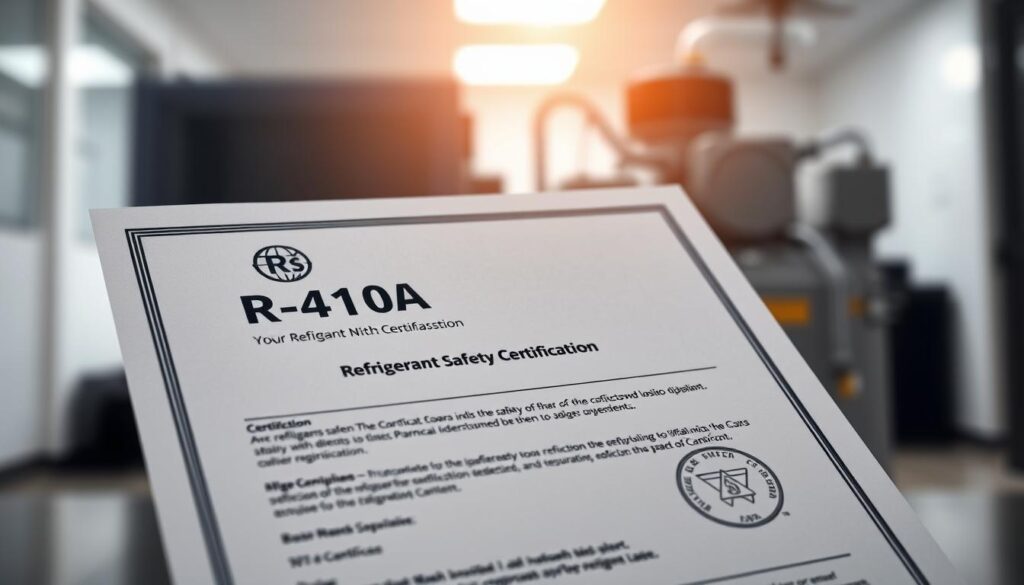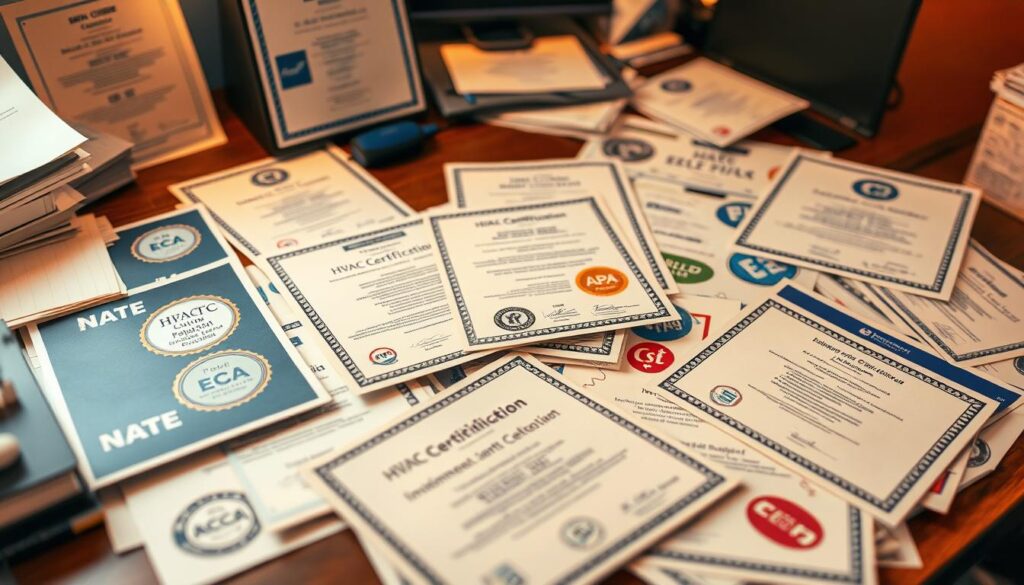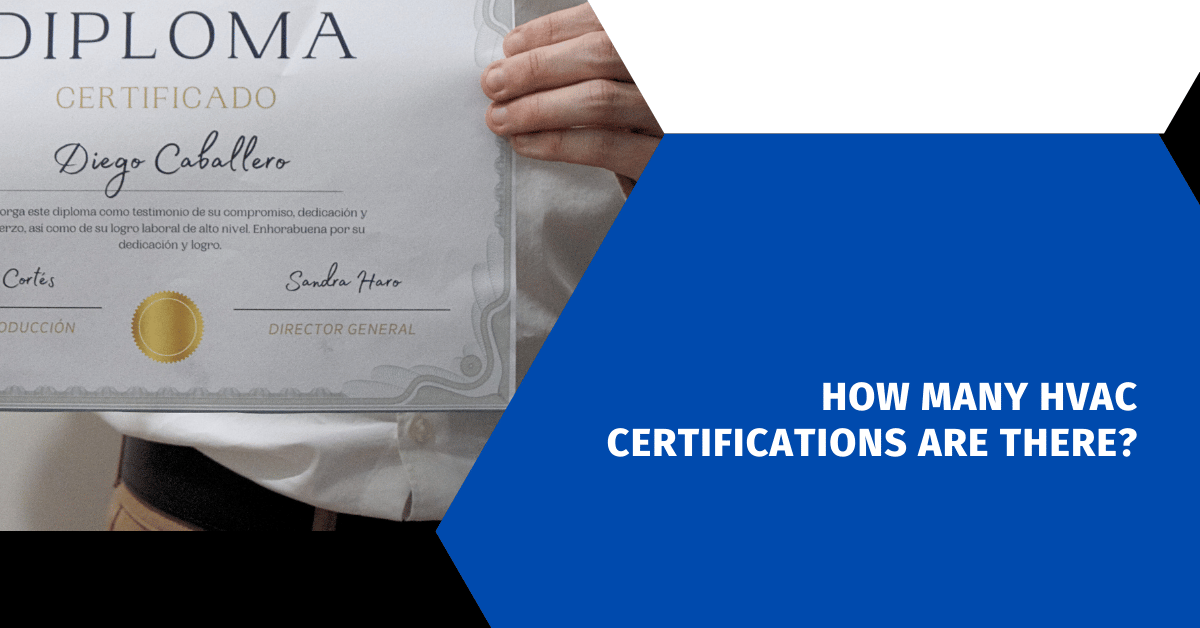How Many HVAC Certifications Are There? Ever wondered about the world of HVAC technician certifications? Knowing how many certifications are out there can open doors to a rewarding career in this field.

The HVAC industry has many certification paths for professionals. While five main certifications are well-known, there are more options. These include EPA Certification, R-410A Certification, Indoor Air Quality Certification, NATE Certification, and Preventive Maintenance HVAC Certification.
Starting your HVAC technician certification journey is all about recognizing the value of specialized training. Each certification brings a unique skill set. This can greatly boost your career and technical skills.
Key Takeaways
- Five core HVAC certifications provide foundational industry knowledge
- Certifications validate technical competence and expertise
- Different certifications cater to specific HVAC specializations
- Professional credentials can significantly improve career prospects
- Continuous learning is key in the ever-changing HVAC industry
Table of Contents
Understanding the Importance of HVAC Certifications
HVAC certifications are key for those in the heating, ventilation, and air conditioning field. They show a technician’s dedication to quality, the environment, and their career growth.
The importance of HVAC certification types is huge. Every HVAC technician needs EPA certification for handling refrigerants. This ensures safety and follows industry rules.
Environmental Impact and Regulations
Protecting the environment is at the heart of HVAC licensing. The EPA Section 608 Technician Certification is vital. It helps stop harmful refrigerant emissions. Technicians must follow strict rules for:
- Refrigerant removal
- Reclamation processes
- Leak management techniques
Career Advancement Opportunities
Certifications boost your career. 75% of employers prefer hiring technicians with industry certifications, like NATE. These certifications prove a technician’s skills and open up:
- Higher-paying jobs
- Specialized roles
- Professional recognition
Legal Requirements and Compliance
Many states require specific HVAC licenses. Technicians must understand complex rules. They need to meet state and federal standards. Proper certification shows they are skilled and follow best practices.
Explore Our HVAC Shop
Looking for top-rated HVAC tools, parts, and accessories? Visit our shop and find the perfect solution for your needs.
Visit the ShopEssential HVAC Certification Types
Understanding HVAC training programs can be tricky. But knowing the different hvac certificate levels is key for your career. The HVAC world has many certification paths that show your skills and knowledge.
Key certification types include:
- EPA 608 Certification: The cornerstone of HVAC credentials, mandatory for technicians working with refrigerants
- NATE Certification: A highly respected industry standard recognized across North America
- HVAC Excellence Certification: Validates knowledge across multiple HVAC disciplines
- R-410A Safety Certification: Specialized training for handling specific refrigerant types
The EPA 608 Certification is a must-have. It shows you can work safely with refrigerants and proves your technical skills. It has four levels:
- Type I: Small Appliances
- Type II: High-Pressure Systems
- Type III: Low-Pressure Systems
- Universal: Covering All Appliance Types
“Certification is not just a piece of paper – it’s your passport to professional credibility in the HVAC industry.”
Professional HVAC technicians often get more than one certification. This makes them more attractive to employers. Your HVAC training will prepare you for these certifications.
EPA Section 608 Certification Requirements
The EPA Section 608 Certification is key for HVAC pros working with refrigerants. It makes sure they can handle these systems safely and right.
Knowing about certifications is important for HVAC careers. The EPA has four levels of certification. They match different needs:
- Type I Certification: Focused on small appliances
- Type II Certification: Designed for high-pressure systems
- Type III Certification: Tailored for low-pressure systems
- Universal Certification: Covers all system types
Certification Requirements and Exam Details
To get certified, technicians must pass a test. Here’s what you need to know:
- Passing score is 70% for proctored exams
- Each exam section has 25 multiple-choice questions
- Two-hour time limit with warnings
- Closed-book format with limited materials
Certification Scope and Importance
The EPA Section 608 Certification is vital for HVAC. It covers refrigerant handling in different sizes. From small units to big systems.
“Proper certification ensures safe and environmentally responsible refrigerant management.”
Those who pass all levels get a Universal Certification. It shows they know how to handle refrigerants in all systems.
Explore Our HVAC Shop
Looking for top-rated HVAC tools, parts, and accessories? Visit our shop and find the perfect solution for your needs.
Visit the ShopNATE Certification: Industry Standard Excellence
North American Technician Excellence (NATE) certification is the top honor in HVAC. It shows you’re a pro in your field. It proves your skills and dedication to HVAC.
NATE has different paths for HVAC techs to show their abilities. The tests are tough. Only the best get this honor.
- Professional HVAC Technician Certification
- Entry Level Certificate
- Specialized Professional Certification Exams
To get NATE certified, you need to have enough experience:
- Installation techs need at least 1 year of experience.
- Service techs must have 2 years of experience.
- Senior techs need 5 years of experience.
The certification has two main ways to get it:
- Traditional Pathway: You need to pass a 50-item Core exam and a 100-item Specialty exam.
- CHP-5 Pathway: You take 5 exams with 30 questions each.
NATE certification lasts for two years. You can renew it by taking 16 hours of continuing education or retaking the specialty exam. Employers love NATE-certified techs. They know they’re getting the best in HVAC.
HVAC Excellence Professional Certifications
HVAC Excellence has been a key player in HVAC technician development for over 25 years. Their certification programs offer many paths for career growth and technical skills.
As an HVAC pro, you can get various certifications that show your skills and dedication. HVAC Excellence has different certifications for all career levels and specializations.
Specialty Areas and Requirements
The organization has many certification options for HVAC pros:
- Student Outcome Assessments
- Employment Ready Certifications
- Professional Technician Certification
- Master Specialist Certifications
Professional Development Pathways
Your career can grow through different certifications:
- Entry-Level Certifications: First check of technical skills
- Professional Technician Level: Needs two years of work experience
- Master Specialist Level: Requires three years of experience
Certification Benefits
Getting HVAC Excellence certifications brings big benefits:
| Certification Level | Key Benefits |
|---|---|
| Student Assessment | Shows your technical skills |
| Professional Technician | Opens doors for career growth |
| Master Specialist | Highlights your advanced skills |
Investing in these certifications shows you’re serious about being the best in HVAC.
Explore Our HVAC Shop
Looking for top-rated HVAC tools, parts, and accessories? Visit our shop and find the perfect solution for your needs.
Visit the ShopR-410A Safety and Handling Certification

R-410A certification is key in today’s HVAC training. It teaches technicians to work with high-pressure refrigerant systems safely. Knowing how to handle R-410A is vital for HVAC pros.
The certification covers important R-410A handling topics:
- High-pressure system management
- Safety protocols for refrigerant handling
- Understanding refrigerant characteristics
- Proper equipment usage
Technicians need to know R-410A’s unique traits. It works under high pressures, needing special skills. These skills are part of advanced HVAC training.
Important safety steps for R-410A include:
- Wearing safety glasses and protective gloves
- Using DOT 4BA 400 or DOT 4BW 400 standard recovery cylinders
- Understanding pressure relief valve settings
- Implementing proper moisture control techniques
Professional tip: Taking R-410A certification seminars can boost your skills and knowledge.
Safety and expertise are key when working with high-pressure refrigerant systems.
Indoor Air Quality Certification Programs
Indoor air quality (IAQ) certification is key for HVAC pros looking to grow their careers. These programs teach advanced skills for tackling air quality issues in homes and businesses.
Those who get IAQ certifications learn a lot about air quality systems and new solutions. The Certified Ventilation Inspector (CVI) is a top certification in this field.
Training Requirements
To get an IAQ certification, you need to go through detailed training. This training covers important areas like:
- HVAC system components and how they work together
- How to assess indoor air quality
- Strategies for managing risks
- Important safety rules for the industry
Industry Applications
Having a CVI certification shows you’re serious about improving your skills. It lets you:
- Do thorough checks on air systems
- Spot air quality dangers
- Offer top-notch fixes for air problems
- Build trust with clients
Professional Standards
The CVI certification is made by experts and tested through tough job analysis. It ensures pros meet top standards. Key points include:
- Renewable every 3 years
- A global recognized badge
- Follows EPA’s I-BEAM program rules
- Covers a wide range of technical areas in the exam
By getting IAQ certifications, HVAC pros can open up more career doors. They show they’re experts in keeping indoor spaces healthy.
Explore Our HVAC Shop
Looking for top-rated HVAC tools, parts, and accessories? Visit our shop and find the perfect solution for your needs.
Visit the ShopHow Many HVAC Certifications Are There?

Exploring hvac industry certifications reveals a wide range of professional credentials. The HVAC field has many certification paths. These paths show your expertise and boost your career.
Professionals can get several key hvac certifications. These are vital for career growth and meeting legal standards. The main certifications include:
- EPA Section 608 Certification
- NATE (North American Technician Excellence) Certification
- R-410A Safety Certification
- Indoor Air Quality Certification
- HVAC Excellence Professional Certification
To understand hvac certifications, look at each credential’s specific needs. Some focus on certain equipment, while others cover a wide range of skills.
| Certification Type | Primary Focus | Experience Required |
|---|---|---|
| EPA Section 608 | Refrigerant Handling | Entry-Level |
| NATE Certification | Technical Competency | 1-2 Years |
| HVAC Excellence | Professional Expertise | 2+ Years |
Certification needs change by state and area, so ongoing learning is key for HVAC pros. Each certification marks a big step in your technical skills and career.
State-Specific Licensing Requirements
Understanding HVAC licensing rules can be tricky. Each state has its own set of rules. It’s important for HVAC pros to know these rules to grow their careers.
Every state has its own way of testing HVAC skills. Some main differences include:
- Experience duration requirements range from 2-4 years
- Examination complexity differs by state
- Insurance and bonding mandates fluctuate
- Local jurisdictional regulations can supersede state guidelines
For example, Alabama needs 3,000 hours of work experience. Alaska requires journeyman experience in four of the last six years. Arizona is more flexible, accepting either four years of direct experience or two years plus formal education.
Some states have less oversight from hvac credentialing agencies. Colorado and Illinois don’t have state licensing but might have local rules. On the other hand, Maryland and Connecticut have detailed licensing systems.
Important things for HVAC pros to remember include:
- Check specific local licensing needs
- Keep certifications up to date
- Follow insurance and bonding rules
- Keep up with continuing education
By researching your state’s rules, you stay legal and credible in the HVAC field.
Explore Our HVAC Shop
Looking for top-rated HVAC tools, parts, and accessories? Visit our shop and find the perfect solution for your needs.
Visit the ShopHVAC Certification Renewal Process
Keeping your professional credentials up to date is key in the HVAC world. Renewing your certification keeps you in the loop with new tech and standards. It’s all about keeping your skills sharp through ongoing learning.
Knowing how to renew your certification is vital for your career. Each certification has its own rules for renewal. These rules affect your training and professional status.
Continuing Education Requirements
Most HVAC certifications need you to keep learning. Here are some common requirements:
- 16 continuing education hours for NATE certification
- 8 hours of state-mandated training
- At least one hour focused on state-specific laws
Maintenance of Credentials
Keeping your credentials up involves several steps:
- Track certification expiration dates
- Complete required continuing education
- Submit renewal applications
- Pay renewal fees
Renewal Timelines
| State | Renewal Frequency | CE Hours Required |
|---|---|---|
| Alabama | Annually | 8 hours |
| Florida | Biennially | 14 hours |
| Texas | Annually | 8 hours |
“Staying current is not just about renewal—it’s about professional growth and excellence in the HVAC industry.”
Don’t forget to apply for renewal 30-60 days before it expires to avoid extra fees. Online renewal is usually quicker and gives you instant confirmation.
Career Growth Through Multiple Certifications
To move up in your HVAC career, you need to grow your skills and get the right certifications. Getting more HVAC certifications can really boost your knowledge and appeal in this fast-changing field. Starting technicians can make more money by getting different certifications.
Getting more certifications helps you focus on specific areas of HVAC. For example, getting EPA Section 608 and NATE certifications makes you a well-rounded expert. Mid-level technicians make about $69,908 a year by learning and getting more certifications.
Understanding new tech and rules is key to growing in your career. Senior engineers can make up to $131,822 a year by always learning and getting certified. Staying up-to-date keeps you ahead in a changing industry.
Think about getting certifications like indoor air quality inspector or energy auditor. These extra skills make you more valuable and open up better-paying jobs. Your dedication to learning sets you apart in the HVAC job market.
FAQ
How many HVAC certifications are there?
What is the most important HVAC certification?
Do HVAC certifications expire?
Are HVAC certifications the same in all states?
How long does it take to get an HVAC certification?
Can I work in HVAC without certification?
What is the most advanced HVAC certification?
How much does HVAC certification cost?
How many HVAC certifications are there?
What is the most important HVAC certification?
Do HVAC certifications expire?
Are HVAC certifications the same in all states?
How long does it take to get an HVAC certification?
Can I work in HVAC without certification?
What is the most advanced HVAC certification?
How much does HVAC certification cost?
FAQ
How many HVAC certifications are there?
There are many HVAC certifications. These include EPA Section 608 Certification, NATE Certification, and HVAC Excellence Professional Certifications. You also have R-410A Safety Certification and Indoor Air Quality Certifications. The number can be between 10-15, depending on the specialization.
What is the most important HVAC certification?
The EPA Section 608 Certification is key for HVAC techs. It’s needed for anyone working with refrigerants. It comes in four types: Type I, II, III, and Universal. Each type covers different refrigerant handling and system complexities.
Do HVAC certifications expire?
Yes, HVAC certifications need to be renewed. Renewal times vary from 1-3 years, based on the certification. To renew, you must complete continuing education courses. This keeps your skills up to date with industry standards.
Are HVAC certifications the same in all states?
No, HVAC certification and licensing vary by state. While some, like EPA Section 608, are recognized nationwide, state-specific licenses differ. Always check with your local licensing board for specific requirements.
How long does it take to get an HVAC certification?
Getting an HVAC certification takes different amounts of time. Basic certifications can be earned in 6-12 months through vocational programs. More advanced certifications, like NATE or HVAC Excellence, may take several years of experience and training.
Can I work in HVAC without certification?
Generally, no. Most states require certification or licensing for HVAC techs, mainly for refrigerant handling. The EPA Section 608 Certification is a minimum for working with refrigeration and air conditioning systems.
What is the most advanced HVAC certification?
The NATE (North American Technician Excellence) Certification is top-tier in the HVAC field. It shows a technician’s high technical knowledge and skill across various HVAC systems and specializations.
How much does HVAC certification cost?
HVAC certification costs vary. Basic certifications are 0-0. More extensive programs can be
FAQ
How many HVAC certifications are there?
There are many HVAC certifications. These include EPA Section 608 Certification, NATE Certification, and HVAC Excellence Professional Certifications. You also have R-410A Safety Certification and Indoor Air Quality Certifications. The number can be between 10-15, depending on the specialization.
What is the most important HVAC certification?
The EPA Section 608 Certification is key for HVAC techs. It’s needed for anyone working with refrigerants. It comes in four types: Type I, II, III, and Universal. Each type covers different refrigerant handling and system complexities.
Do HVAC certifications expire?
Yes, HVAC certifications need to be renewed. Renewal times vary from 1-3 years, based on the certification. To renew, you must complete continuing education courses. This keeps your skills up to date with industry standards.
Are HVAC certifications the same in all states?
No, HVAC certification and licensing vary by state. While some, like EPA Section 608, are recognized nationwide, state-specific licenses differ. Always check with your local licensing board for specific requirements.
How long does it take to get an HVAC certification?
Getting an HVAC certification takes different amounts of time. Basic certifications can be earned in 6-12 months through vocational programs. More advanced certifications, like NATE or HVAC Excellence, may take several years of experience and training.
Can I work in HVAC without certification?
Generally, no. Most states require certification or licensing for HVAC techs, mainly for refrigerant handling. The EPA Section 608 Certification is a minimum for working with refrigeration and air conditioning systems.
What is the most advanced HVAC certification?
The NATE (North American Technician Excellence) Certification is top-tier in the HVAC field. It shows a technician’s high technical knowledge and skill across various HVAC systems and specializations.
How much does HVAC certification cost?
HVAC certification costs vary. Basic certifications are $100-$500. More extensive programs can be $1,000-$3,000. Costs include training, study materials, and exam fees. Many schools offer affordable prep programs.
,000-,000. Costs include training, study materials, and exam fees. Many schools offer affordable prep programs.

